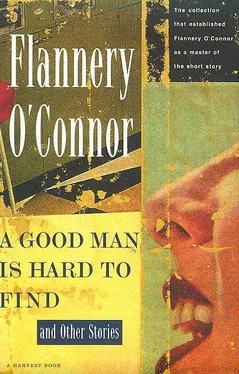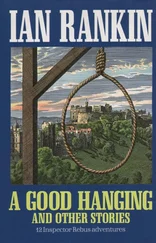“Listen here,” the smallest boy said, “all the time we been knowing him he’s been telling us about this here place. Said it was everything here. Said it was horses here. Said he had the best time of his entire life right here on this here place. Talks about it all the time.”
“Never shuts his trap about this place,” the big boy grunted, drawing his arm across his nose as if to muffle his words.
“Always talking about them horses he rid here,” the small one continued, “and said he would let us ride them too. Said it was one name Gene.”
Mrs. Cope was always afraid someone would get hurt on her place and sue her for everything she had. “They aren’t shod,” she said quickly. “There was one named Gene but he’s dead now but I’m afraid you boys can’t ride the horses because you might get hurt. They’re dangerous,” she said, speaking very fast.
The large boy sat down on the ground with a noise of disgust and began to finger rocks out of his tennis shoe. The small one darted looks here and there and Powell fixed her with his stare and didn’t say anything.
After a minute the little boy said, “Say, lady, you know what he said one time? He said when he died he wanted to come here!”
For a second Mrs. Cope looked blank; then she blushed; then a peculiar look of pain came over her face as she realized that these children were hungry. They were staring because they were hungry! She almost gasped in their faces and then she asked them quickly if they would have something to eat. They said they would but their expressions, composed and unsatisfied, didn’t lighten any. They looked as if they were used to being hungry and it was no business of hers.
The child upstairs had grown red in the face with excitement. She was kneeling down by the window so that only her eyes and forehead showed over the sill. Mrs. Cope told the boys to come around on the other side of the house where the lawn chairs were and she led the way and Mrs. Pritchard followed. The child moved from the right bedroom across the hall and over into the left bedroom and looked down on the other side of the house where there were three white lawn chairs and a red hammock strung between two hazelnut trees. She was a pale fat girl of twelve with a frowning squint and a large mouth full of silver bands. She knelt down at the window.
The three boys came around the corner of the house and the large one threw himself into the hammock and lit a stub of cigarette. The small boy tumbled down on the grass next to the black suitcase and rested his head on it and Powell sat down on the edge of one of the chairs and looked as if he were trying to enclose the whole place in one encircling stare. The child heard her mother and Mrs. Pritchard in a muted conference in the kitchen. She got up and went out into the hall and leaned over the banisters.
Mrs. Cope’s and Mrs. Pritchard’s legs were facing each other in the back hall. “Those poor children are hungry,” Mrs. Cope said in a dead voice.
“You seen that suitcase?” Mrs. Pritchard asked. “What if they intend to spend the night with you?”
Mrs. Cope gave a slight shriek. “I can’t have three boys in here with only me and Sally Virginia,” she said. “I’m sure they’ll go when I feed them.”
“I only know they got a suitcase,” Mrs. Pritchard said.
The child hurried back to the window. The large boy was stretched out in the hammock with his wrists crossed under his head and the cigarette stub in the center of his mouth. He spit it out in an arc just as Mrs. Cope came around the corner of the house with a plate of crackers. She stopped instantly as if a snake had been slung in her path. “Ashfield!” she said. “Please pick that up. I’m afraid of fires.”
“Gawfield!” the little boy shouted indignantly. “Gawfield!”
The large boy raised himself without a word and lumbered for the butt. He picked it up and put it in his pocket and stood with his back to her, examining a tattooed heart on his forearm. Mrs. Pritchard came up holding three Coca-Colas by the necks in one hand and gave one to each of them.
“I remember everything about this place,” Powell said, looking down the opening of his bottle.
“Where did you all go when you left here?” Mrs. Cope asked and put the plate of crackers on the arm of his chair.
He looked at it but didn’t take one. He said, “I remember it was one name Gene and it was one name George. We gone to Florda and my daddy he, you know, died, and then we gone to my sister’s and then my mother she, you know, mah’d, and we been there ever since.”
“There are some crackers,” Mrs. Cope said and sat down in the chair across from him.
“He don’t like it in Atlanta,” the little boy said, sitting up and reaching indifferently for a cracker. “He ain’t ever satisfied with where he’s at except this place here. Lemme tell you what he’ll do, lady. We’ll be playing ball, see, on this here place in this development we got to play ball on, see, and he’ll quit playing and say, ‘Goddam, it was a horse down there name Gene and if I had him here I’d bust this concrete to hell riding him!’ “
“I’m sure Powell doesn’t use words like that, do you, Powell?” Mrs. Cope said.
“No, mam,” Powell said. His head was turned completely to the side as if he were listening for the horses in the field.
“I don’t like them kind of crackers,” the little boy said and returned his to the plate and got up.
Mrs. Cope shifted in her chair. “So you boys live in one of those nice new developments,” she said.
“The only way you can tell your own is by smell,” the small boy volunteered. “They’re four stories high and there’s ten of them, one behind the other. Let’s go see them horses,” he said.
Powell turned his pinching look on Mrs. Cope. “We thought we would just spend the night in your barn,” he said. “My uncle brought us this far on his pick-up truck and he’s going to stop for us again in the morning.”
There was a moment in which she didn’t say a thing and the child in the window thought: she’s going to fly out of that chair and hit the tree.
“Well, I’m afraid you can’t do that,” she said, getting up suddenly. “The barn’s full of hay and I’m afraid of fire from your cigarettes.”
“We won’t smoke,” he said.
“I’m afraid you can’t spend the night in there just the same,” she repeated as if she were talking politely to a gangster.
“Well, we can camp out in the woods then,” the little boy said. “We brought our own blankets anyways. That’s what we got in thatere suitcase. Come on.”
“In the woods!” she said. “Oh no! The woods are very dry now, I can’t have people smoking in my woods. You’ll have to camp out in the field, in this field here next to the house, where there aren’t any trees.”
“Where she can keep her eye on you,” the child said under her breath.
“Her woods,” the large boy muttered and got out of the hammock.
“We’ll sleep in the field,” Powell said but not particularly as if he were talking to her. “This afternoon I’m going to show them about this place.” The other two were already walking away and he got up and bounded after them and the two women sat with the black suitcase between them.
“Not no thank you, not no nothing,” Mrs. Pritchard remarked.
“They only played with what we gave them to eat,” Mrs. Cope said in a hurt voice.
Mrs. Pritchard suggested that they might not like soft drinks.
“They certainly looked hungry,” Mrs. Cope said.
About sunset they appeared out of the woods, dirty and sweating, and came to the back porch and asked for water. They did not ask for food but Mrs. Cope could tell that they wanted it. “All I have is some cold guinea,” she said. “Would you boys like some guinea and some sandwiches?”
Читать дальше









